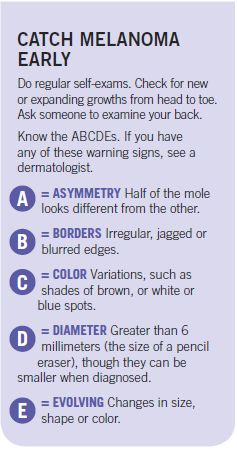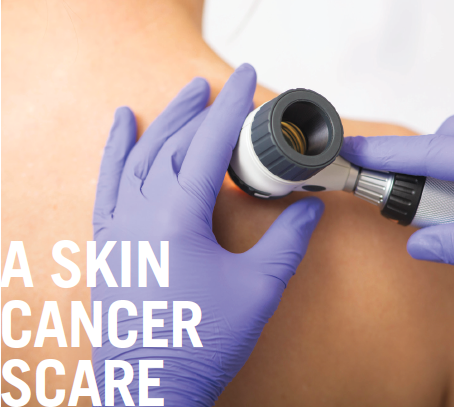Finding melanoma early saved a recent retiree’s life.
Heading into 2020, Tom Brougham had big plans. He was set to retire from his 26-year career with the Rahway Police Department, and he and his wife, Judy, were going to Hawaii to celebrate.
Before the trip, Judy noticed a mole on Tom’s back. “She wanted me to get it checked out,” says Tom, 51. “I told her I’d do it after we got back from Hawaii.”
out,” says Tom, 51. “I told her I’d do it after we got back from Hawaii.”
By the time they returned to their home in Clark, COVID-19 had hit. “So I put the doctor visit off some more,” Tom says. But Judy remained persistent.
Finally, in April, Tom saw a dermatologist, who performed a biopsy on the mole, which had grown. The biopsy confirmed a life-threatening diagnosis: melanoma. “That,” Tom says, “scared the hell out of me.”
Before choosing a skin cancer surgeon, Tom and Judy researched several physicians. They chose Franz Smith, MD, an oncologic surgeon at Saint Barnabas Medical Center.
“He was comforting, and the oncology nurse navigator, Moira Davis, RN, explained everything to us and reassured us,” Judy says. “When we left the office, we were optimistic.”
What Is Melanoma?
While melanoma accounts for just one percent of all skin cancers diagnosed in the U.S., it’s the deadliest type, with about 7,100 people expected to die of it in 2021.
Melanoma develops when melanocytes (the cells that give the skin its tan or brown color) start to grow out of control, according to the American Cancer Society. Risk factors include exposure to UV (ultraviolet light) from the sun and a family history of melanoma. Males and people over 50 are most at risk.
“Men who work outdoors often are more likely to have excessive sun exposure, which can cause skin cancer,” explains Dr. Smith.
“Men also are less likely to follow up with a doctor when they see a suspicious mole.” Fortunately, surgery can cure the majority of melanomas. “That’s why early detection is so important,” Dr. Smith says.
In June 2020, Dr. Smith removed the mole on Tom’s back along with several lymph nodes. “I was in and out of the hospital the same day,” Tom says. The good news: His cancer hadn’t spread.
Now, he and Judy are enjoying retirement. His message to other men: “Listen to your wife,” he says, “and go to the doctor as soon as you see anything suspicious on your skin.”
At The Melanoma Center at Saint Barnabas Medical Center, our team of specialists offers advanced skin cancer screening, expert diagnosis and state-of-the-art treatment of melanoma.
RWJBarnabas Health and the Cancer Center at Saint Barnabas Medical Center, together with Rutgers Cancer Institute of New Jersey—the state’s only NCI-Designated Comprehensive Cancer Center—provide close-to-home access to the latest treatment options. To learn more, call 844.CANCERNJ or visit www.rwjbh.org/beatcancer.
